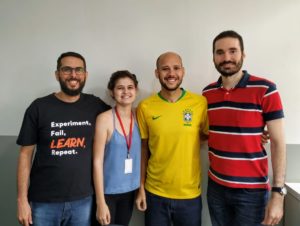TUTORIALS

Speak: Graciela Hadad
Institution: Universidad Nacional del Oeste, Argentina)
Abstract: A requirements engineering process should not be unique under any development situation: software type, project constraints, customer organization, experience of developers, volatility of the application domain, and many other factors. Most situational factors, when considered in software projects, have a high influence on the requirements process. Therefore, the different situations that may attempt against or may favor a successful requirements process should be identified at the beginning of the project. Additionally, some of such factors may evolve along software development life cycle; this should motivate a re-designing of the requirements process at some strategic milestones. It will be shown a process for constructing and dynamically adapting a requirements process, focusing on the evolving factors. The process follows rules based on different combinations of situational factors at specific control points and manages a repository of process blocks to perform the tailoring.
Biography: Graciela D. S. Hadad has a degree in Information Systems Bachelor at Universidad de Buenos Aires (Argentina, 1983), and has received a Ph.D. in Computer Science at Universidad Nacional de La Plata (Argentina, 2008). She has conducted software developer teams in several Argentine companies during the past thirty years. She has been teaching Software Engineering in undergraduate courses for the last thirty-two years at different universities. She has been participating in research projects since 1995. Currently, she is a full professor and researcher at Universidad Nacional del Oeste, while also teaching at Universidad Nacional de La Matanza and Universidad de Belgrano. Since 2003, she has been teaching Requirements Engineering in post-graduate courses at different universities. She is supervisor and co-supervisor of Master Thesis and Doctoral Thesis. She currently belongs to a Requirements Engineering research group at Universidad Nacional del Oeste and at Universidad de Belgrano. She has published several papers in conference proceedings, journals and book chapters along these years.

Abstract: Data from software applications often reveal a large amount of personal information and can be used for purposes other than those originally intended. Disclosure of this information in an unregulated way raises privacy concerns. Thus, the literature reports the need for systematic approaches to specifying privacy requirements in the development of software systems. Moreover, it is well- known that agile software development (ASD) has been increasingly adopted in industry as it can minimize the challenges related to requirements changes through short iterations and active stakeholders. Therefore, we explore privacy in Requirements Engineering (RE) by presenting a privacy specification capabilities framework and a method, “Privacy Criteria” to deal with privacy during requirements specification activities in ASD. In this tutorial, you will learn:
1. The basics of privacy concepts
2. Privacy concepts and its relationships
3. Privacy specification capabilities framework
4. Privacy Criteria and its tool
5. Combine the Privacy Criteria with other ASD requirements specification techniques
At the end of this tutorial, you will have the knowledge and resources to start the specification of privacy requirements in ASD.
Speaks and Biography:
Mariana Maia is a Ph.D. student at the Center of Informatics at the Federal University of Pernambuco (CIn-UFPE). Her Ph.D. focuses on methods and practices for supporting privacy requirements specification. Her work on this subject includes a privacy specification capabilities framework and the Privacy Criteria method for privacy requirements specification. Besides that, her research interests include education in computer science, agile development, software engineering, requirements engineering, requirements modeling and privacy requirements.
Carla Silva is an Associate Professor at the Center of Informatics at Universidade Federal de Pernambuco (CIn-UFPE), since 2011. Her research interests are in Software Engineering, mainly in the following subjects: Requirements Engineering, Model Driven Software Development, Software Product Line Engineering and Adaptive Systems. Recently, she achieved the milestone of 100 scientific papers published, many of them in high impact conferences and journals. Her current h-index is 16, according to Google Scholar. She has been serving as a Program Committee member of workshops and conferences. Occasionally, she has served as reviewer for scientific journals. She is also supervisor of Ph.D. students.

Rodrigo Cursino (CesarSchool, Brazil), Aline Barbosa (UPE, Brazil), Daniel Ferreira (Cesar, Brazil) and João Pimentel (UFRPE, Brazil).
Resumo: Este tutorial, apresentado em português, possui uma abordagem mão na massa (hands on) para trabalhar a gamificação de processos aplicados à Engenharia de Requisitos (ER). A parte teórica contempla uma breve introdução a ER, os principais conceitos de jogos e gamificação, elementos e mecânicas de ambos, e processos de gamificação. Tudo isso com muitos exemplos concretos. Na segunda metade do tutorial, os participantes serão convidados a criar um processo gamificado em equipe, seguindo um processo bem definido, a partir de problemas específicos trazidos pela equipe organizadora.
Speaks:
João Pimentel é professor na Universidade Federal Rural de Pernambuco (UFRPE). É um pesquisador ativo nos campos de Engenharia de Software e Engenharia de Requisitos (ER), com mais de 50 publicações em eventos e periódicos internacionais de alta qualidade. Atua com jogos e gamificação em ER desde 2012. Recentemente, esteve envolvido na organização ou no comitê de programa em múltiplas edições do ACM SAC, CAISE, CLEI, CIbSE, IWSSA, QUATIC, RCIS, RE, SBES, SEKE, and WER. Adicionalmente, João lidera o projeto piStar tool.
Rodrigo Botelho é Consultor de Testes do CESAR, professor da Cesar School, e agrega mais de 14 anos de experiência em desenvolvimento de software, com foco em Testes e Metodologias Ágeis. É Mestre pela Universidade de Pernambuco (UPE), com ênfase em Gamificação para Engenharia de Requisitos. Foi palestrante e organizador de eventos de relevância nacional como o Agile Brazil, Agilidade@Recife, Agile Trends e Agile Testing Days. Foi membro do time Cesar Brazil, campeão mundial da Copa do Mundo de Testes de Software (2014). É também co-organizador do Ministry of Testing Recife, comunidade que viabiliza o compartilhamento de conhecimento em qualidade e teste de software.
Daniel Ferreira é mestre pela Universidade de Pernambuco (UPE), com ênfase em Gamificação para Engenharia de Requisitos. Trabalha no CESAR com desenvolvimento web e para dispositivos móveis. Desde 2002 trabalha com o .NET Framework através de diferentes projetos e empresas. Certificado como Microsoft Certified Professional Developer (MCPD), também foi nomeado como Microsoft Student Partner entre 2007 e 2011. Também atua como professor no CESAR.EDU e em diversas universidades do Brasil.
Aline Barbosa é mestra em Engenharia da Computação pela Universidade de Pernambuco (UPE), com ênfase em games para ensino no contexto de Engenharia de Requisitos. Além de ter artigos científicos em eventos brasileiros importantes da área, como SBGames, WIE e WEI, também tem experiência em ensino e em Comunicação Não-Violenta.

Jessyka Flavyanne Vilela (Cin-UFPE, Brazil) and Jaelson Castro (Cin-UFPE, Brazil).
Resumo: Sistemas críticos consistem em uma combinação de hardware e software que precisa ser tolerante à falha. Sendo assim, o seu desenvolvimento exige processos rigorosos de análise de segurança de seus requisitos. O objetivo desse tutorial interativo é introduzir os conceitos envolvidos na análise preliminar de segurança de sistemas críticos por meio de exemplos.
Biografia:
Jéssyka Vilela is a professor at Universidade Federal de Pernambuco (UFPE). She is a Computer Engineer from Universidade Federal do Vale do São Francisco (UNIVASF) and she holds a MSc and a PhD in software engineering from UFPE. Her main research lines include Safety-Critical Systems, Software Engineering, Security Information, and Quality Assurance. Contact her at
Jaelson Castro is a professor at the Federal University of Pernambuco (UFPE), Brazil, where he leads the Requirements Engineering Laboratory (LER), since 1992. He earned his Ph.D. in 1991 from Imperial College, London. His research interests include requirements engineering, model-driven development, safety engineering, robotics. He has published over three hundred papers and book chapters.
Prof. Castro serves on the editorial board of the Requirements Engineering Journal and Journal of Software Engineering Research and Development. He acted as Editor-in-Chief of the Journal of the Brazilian Computer Society – JBCS. He has also contributed to the organization of several events, acting as General Chair, Program Chair or Organizer Chair.